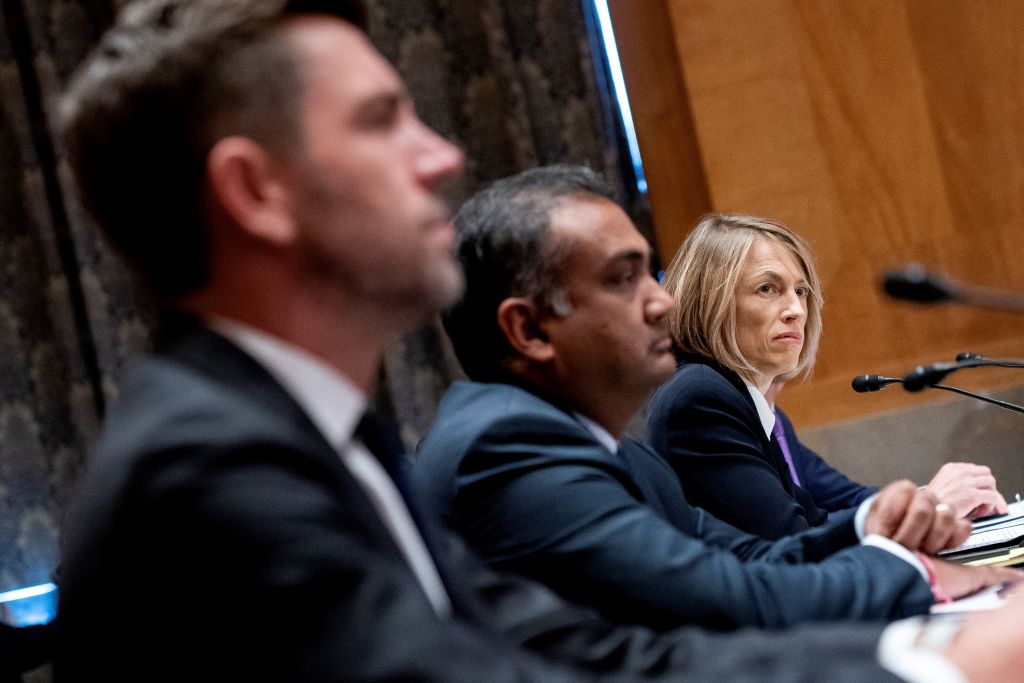
A group of bipartisan Senators agree: the spread of misinformation and disinformation on social media poses a risk to homeland security, and something needs to be done about it. But at a hearing that included executives from Meta, YouTube, TikTok, and Twitter, Republicans and Democrats didn’t get any closer to agreeing on a solution.
The Senate Committee on Homeland Security and Governmental Affairs convened on Wednesday to speak to current and former social media executives, hoping to address how disinformation and extremist ideologies that amplify hate speech and promote violence put the U.S. at risk. But the Senators became quickly bogged down in partisan talking points that ultimately did not seem to bring them any closer to finding a path forward to regulate the social media giants.
It’s a critical moment for the major social media companies. The hearing took the place almost exactly one year after whistleblower Frances Haugen came forward to allege that Facebook and Instagram knowingly downplayed the harm its products caused young people, and the day after Twitter whistleblower Peiter “Mudge” Zatko spoke before Congress about what he called “egregious” security failures.
Read More: The Twitter Whistleblower Needs You to Trust Him
At Wednesday’s hearing, Senators on both sides of the aisle called on the companies to be more transparent, said child sexual abuse content needed to be more urgently addressed, and raised concerns over how cartels use the platforms to conduct illegal activity, including human smuggling. But the bipartisanship stoped there. Most Democratic Senators questioned the social media executives about how algorithms fuel hate groups, how the companies’ algorithms targets users, and how user data is kept and secured. Republican Senators, on the other hand, spent considerable time questioning the executives about their platform’s decisions to censor some COVID-19 content, and TikTok’s association with China.
“People were censored, eminently qualified doctors who had the courage and compassion to treat COVID patients with cheap, generic, widely available drugs,” said Senator Ron Johnson of Wisconsin, a Republican who also expressed concerns about the political leanings of the people employed at the social media companies and whether they could exert influence on elections. “I think hundreds of thousands of people lost their lives because you did not allow a second opinion to be published on your platforms.”
The social media executives struggled to respond to many of the questions and critiques directed at them from both parties. Senator Gary Peters of Michigan, the Democratic chairman of the committee, questioned Meta Chief Product Officer Chris Cox and YouTube Chief Product Officer Neal Mohan about why it took years before Facebook realized it needed to remove QAnon content. (Meta, formerly known as Facebook Inc., owns Facebook and Instagram.) “This stuff was on your platforms for years, so it took you a long time to come to the conclusion,” Peters said. “You caught it, but not until 16% of the American people are part of this insidious theory.”
“To be very clear, we have no incentive to post this content, to promote it in any nature,” Mohan said in response.
Read More: After a Year of Focus on Big Tech’s Harms, Why We’re Still Waiting on Reform
For several minutes, Senator Josh Hawley, a Republican from Missouri, grilled TikTok Chief Operating Officer Vanessa Pappas over whether members of the Chinese Communist Party had access to U.S. user data. Pappas said the Chinese government has never been given access to user data, but could not state whether the company’s employees in China are members of the communist party. “Nobody on this panel would be able to tell you the political affiliation of any individual,” she said.
Earlier in the day, before the current executives appeared before the committee, former Facebook and Twitter executives sat on the panel, and warned Senators that these companies’ lack of transparency poses a danger to the U.S. “Today, you don’t know what’s happening at the platform. You have to trust the companies,” said Brian Boland, a former high-level Facebook executive. “I lost my trust… I think we should move beyond trust to helping our researchers and journalists understand the platforms better.”
Near the end of the hearing none of the social media executives could provide data about how many engineers work on their platforms, one of many questions they were unable or unwilling to answer to the Senators’ satisfaction. “I’ll be honest, I’m frustrated that the chief product officers, all of you, who have a prominent seat at the table when these business decisions are made, were not more prepared to speak to specifics about your product development process,” Peters said in his closing statement. “Your companies continue to really avoid sharing some very important information.”
More Must-Reads from TIME
- Donald Trump Is TIME's 2024 Person of the Year
- Why We Chose Trump as Person of the Year
- Is Intermittent Fasting Good or Bad for You?
- The 100 Must-Read Books of 2024
- The 20 Best Christmas TV Episodes
- Column: If Optimism Feels Ridiculous Now, Try Hope
- The Future of Climate Action Is Trade Policy
- Merle Bombardieri Is Helping People Make the Baby Decision
Write to Jasmine Aguilera at jasmine.aguilera@time.com